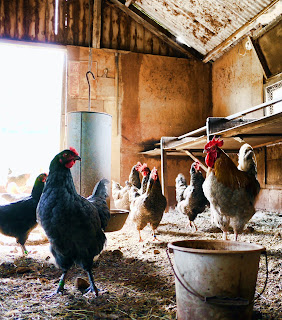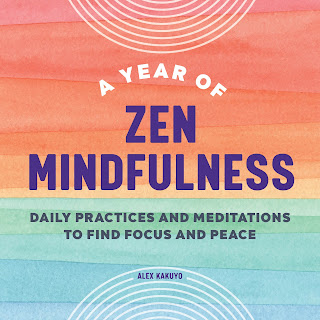Suffering is an inescapable part of life. The sutras tell us that every person has a nature to be born, to grow old, to get sick, and to die. On top of that, we lose the things we want. And we gain the things we don't want.
One way to deal with suffering is to run from it. We run towards pleasure, we run away from pain. And in the midst of all that running, we ignore the sling and arrows of life that are nipping at our heels. We know they'll catch us eventually, but we keep running anyway.
In Buddhism, we take a different approach. We stand still. We wait for suffering to catch us. And when the time is right, we reach out, we grab it with both hands, and we hold our suffering close. We embrace it as a friend.
As Buddhists, we do this not because we enjoy suffering; far from it. We're just sick of running all the time.
When we do this, when we look deep into the eyes of our guilt and our despair, something shifts. And we find happiness where suffering used to be. As a homesteader, I experience this every day.
Now that it's winter, the air is cold. The ground is muddy, and my chickens' water keeps freezing due to the frigid temperatures.
I hate the cold. I hate sliding around in the mud. But my animals need fresh water. More than that, they are buddhas who deserve to be treated well.
So, three times a day I brave the mud and the cold to care for them.
In the moments before I leave the house my head is filled with useless thoughts. I wonder how much longer winter will last. I worry about the patches of ice that litter the ground. The thoughts continue when I step out on my porch.
The wind gets inside my coat; freezing my skin. And as I sit down to put on my work boots, my knees crack and pop like kindling in a fire.
Things get better when I walk out to the chicken coop. The hens cluck and run around in circles as I approach. I don't know if they're happy to see me, or if they're excited about the mealworms I'm about to give them as a treat. I guess it doesn't matter.
I throw some mealworms into their coop, and they descend upon them like zombies attacking a corpse. While they're distracted, I exchange their frozen water for the liquid variety. I also top off their food supply to ensure they'll have plenty to eat when I'm gone.
When I leave the coop I place my hands in gassho, and I chant "Namu Amida Butsu" eighteen times; thrice for each bird. Then I wait. The chickens coo with contentment as they eat the worms, and then one by one they run over to the water feeder for a drink.
As I watch them lap the water into their beaks, something shifts. The wind is still freezing my skin, but it's also refreshing each time breathe it into my lungs. My knees are still sore, but I feel like they can walk a few more miles.
All of my suffering is here, but as I watch the chickens eat and drink, it's joined by something else; happiness.
I'm happy because in a world where each of us is doomed to birth, aging, sickness, and death, I can make life better for the living beings under my care.
As Buddhists, this is how we live. We look deep into the suffering of our lives, and we find moments where we can make things better. Buddhism is washing the dishes when it's not our turn. It's helping our neighbor shovel their driveway, and sharing a kind word with our partner before bed.
Buddhism is finding happiness in a world filled with suffering.
When we do this, our trials and tribulations aren't something to avoid. Instead, they're opportunities to bring light into the world.



"In Buddhism, we take a different approach. We stand still. We wait for suffering to catch us. And when the time is right, we reach out, we grab it with both hands, and we hold our suffering close. We embrace it as a friend." I loved this so much! I love the idea of embracing whatever our experience is without trying to make it something else. I will think about this as I bundle up to take the dog out for a walk later -- like you I'm not keen on being cold, but I will think of my dog as a Buddha and remember how much she enjoys a walk. Besides today is her birthday!
ReplyDeleteI just finished reading your book and I am happy to find this blog! Thank you.
ReplyDelete